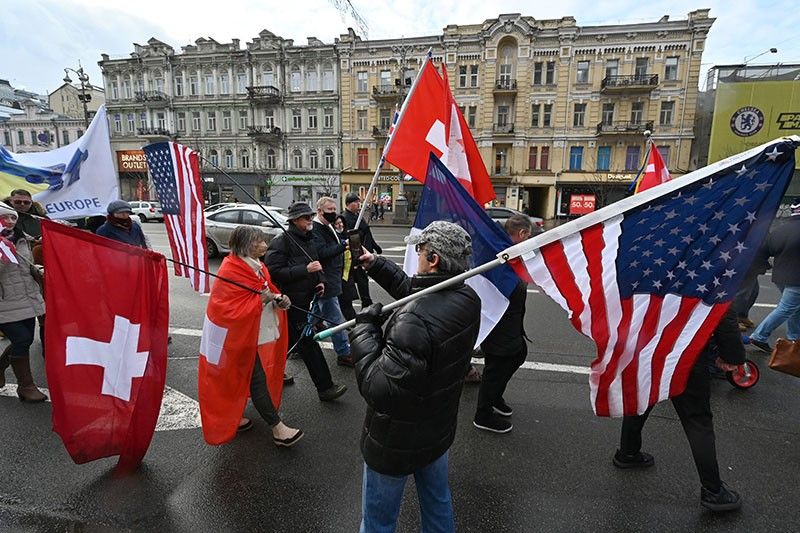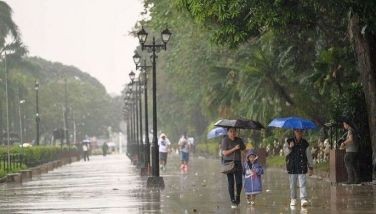Some Filipinos flee Ukraine capital amid threat of Russian invasion

MANILA, Philippines — Some Filipinos have fled the Ukrainian capital of Kyiv amid the looming threat of a Russian invasion of the former Soviet state, feared by Western intelligence officials to happen on Wednesday.
Shirley Santosildes, head of United Filipino Global in Ukraine, told ANC’s “Rundown” on Tuesday that some Filipinos have headed nearly 500 kilometers west of Kyiv to the city of Lviv, where a number of foreign governments, including the US, have relocated their embassies in light of the conflict.
“Lviv is the safest place that we can go to. So far, some Filipinos are already there,” Santosildes said in Filipino.
Santosildes, however, remains in Kyiv as the school that she teaches at assures her that a Russian invasion would not happen, despite the continued massing of Moscow’s troops at its border with Ukraine.
‘All political propaganda’
“We’re still working offline, face-to-face. Our school still has no order for us to leave. They tell us not to worry, that nothing like that will happen and that it’s all just political propaganda,” she said.
She added that the Filipino community in Ukraine is regularly meeting with the Philippine Embassy in Poland, which is offering free flights back to Manila. Around eight Filipinos have so far availed of the free flight back home, Santosildes said.
Unlike the UK, the US, Canada, South Korea and Japan which have all called on their nationals to leave Ukraine as tensions continue to rise, the Philippines has yet to issue a similar advisory to some 380 Filipinos living in the eastern European country.
The Philippines’ Department of Foreign Affairs said Saturday that most of the Filipinos living in Ukraine are in Kyiv, which is “far from the eastern border near Russia.”
Filipinos are “encouraged to contact the embassy, report any untoward incident they might observe in their respective areas, and continue monitoring their Filipino friends through social media.”
Why is there conflict?
Ukraine had long been a part of the Russian empire for centuries before becoming a Soviet state and then becoming independent following the fall of the USSR in 1991. It has since moved to forge closer ties with the West.
The current conflict is a continuation of Russia’s annexation of Ukraine’s Crimean peninsula and its backing of a separatist rebellion in the eastern part of Ukraine in 2014, in response to the removal of Viktor Yanukovych as Ukrainian president due to his rejection of an association agreement with the European Union in favor of closer ties with Moscow.
Ukraine, under the administration of comedian-turned-president Volodymyr Zelensky, has asked the West for help and has wanted to join the North Atlantic Treaty Organization, a military alliance of 30 states.
These moves have miffed Russia under the leadership of Vladimir Putin, who has ordered troops and military equipment to gather near its border with Ukraine.
Russia appeared to open the door Monday to a diplomatic resolution of the deepening Ukraine standoff, as the United States said it believed Putin had yet to make a final decision on invading the eastern European country.
While Russia said it was ending some military drills, signaling a possible easing of the crisis, in Washington the alert level remained high — with a top official calling the threat of invasion "more real than ever before." — with Anna Smolchenko and Dmitry Zaks/AFP
President Volodymyr Zelensky on Saturday secured Turkey's crucial backing for Ukraine's NATO aspirations after winning a US pledge for cluster munitions that could inflict massive damage on Russian forces on the battlefield.
Washington's decision to deliver the controversial weapons — banned across a large part of the world but not in Russia or Ukraine — dramatically ups the stakes in the war, which entered its 500th day Saturday.
Zelensky has been travelling across Europe trying to secure bigger and better weapons for his outmatched army, which has launched a long-awaited counteroffensive that is progressing less swiftly than Ukraine's allies had hoped. — AFP
Washington's decision to supply Ukraine with ATACMS long-range missiles is "a grave mistake", Russian ambassador to the United States Anatoly Antonov says Wednesday.
"The White House's decision to send long-range missiles to Ukrainians is a grave mistake. The consequences of this step, which was deliberately hidden from the public, will be of the most serious nature," he says in a statement. — AFP
President Vladimir Putin says Sunday that Russian forces had made gains in their Ukraine offensive including in Avdiivka, a symbolic industrial hub.
"Our troops are improving their position in almost all of this area, which is quite vast," he says in an interview on Russian television, an extract of which was posted on social media on Sunday. "This concerns the areas of Kupiansk, Zaporizhia and Avdiivka." — AFP
The regional governor says debris from a drone destroyed over the Russian region of Belgorod, which borders Ukraine, fell on homes and killed three people, including a young child.
The air defense system "shot down an aircraft-type UAV (unmanned aerial vehicle) approaching the city", says Governor Vyacheslav Gladkov, adding that the falling debris destroyed several homes.
"Most importantly, three people were killed, one of them a small child," he writes on the Telegram messaging app, accompanied by pictures of a house reduced to a pile of rubble behind red and white police tape. — AFP
Ukraine's air force says on Tuesday that it had destroyed 27 of 36 Russian attack drones overnight in the south of the country.
Ukrainian forces downed 27 "Shahed-136/131" drones in the southern Kherson, Mykolaiv and Odesa regions, the air force said on the messaging platform Telegram.
In all, Moscow had launched 36 of the Iranian-made drones from the Crimean peninsula, which Moscow annexed in 2014, it says. — AFP
The Kremlin claims on Friday Russian forces never targeted civilian infrastructure after Ukraine blamed Moscow for a missile attack that killed over 50 people in the eastern village of Groza.
"We repeat that the Russian military does not strike civilian targets. Strikes are carried out on military targets, on places where military personnel are concentrated," Kremlin spokesman Dmitry Peskov says in his daily briefing. — AFP
- Latest
- Trending
































